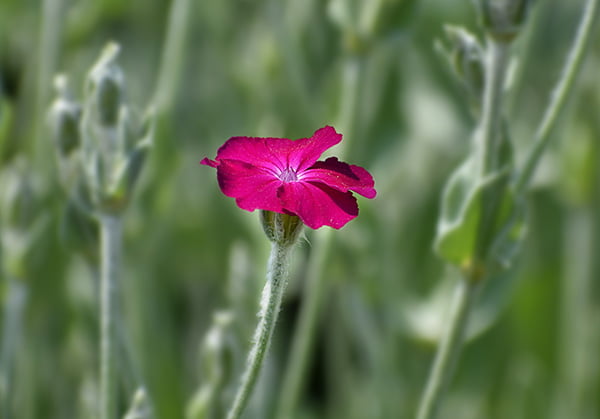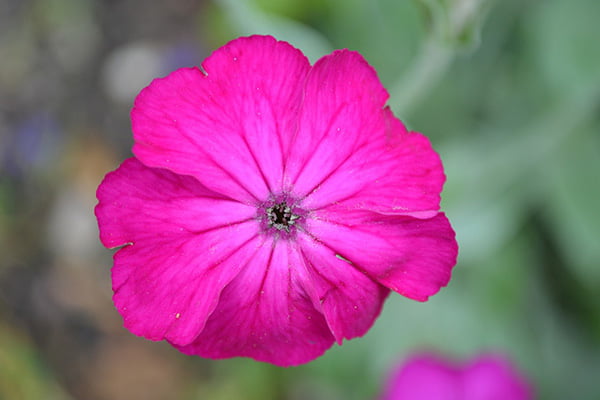There's something quaint and charming about those colorful and somewhat untidy English country gardens. All those plants tumbling over and under each other in a mass of flowers! And there's the added bonus that most plants found in these English gardens are incredibly low-maintenance. We all have enough to do in summer without bothering with landscaping!
Rose Campion was a feature in many of these cottage gardens and is a great addition to gardens today! Its bright color and silvery leaves make it a beautiful contrast to all of the green foliage. Below, we'll tell you everything you need to know to establish Rose Campion in your garden bed.
Botanical Name
Common Name
Plant Type
Mature Size
Sun Requirement
Soil Type
Hardiness Zone
Pet Friendly
Lychnis coronaria
Rose Campion
Perennial
24-36 inches (height)
Full sun to partial shade
Well-drained, average soil
5-8 (USDA)
Yes
What Is Rose Campion?
Rose Campion (Lychnis coronaria and Silene coronaria) is a deer-resistant member of the pink family of flowers (also known as carnations or dianthus). It grows either as a short-lived perennial, meaning it doesn't bloom fully until its second year, and then it dies that winter. It readily self-seeds, which makes it behave essentially like a perennial for landscaping purposes. You should be able to enjoy your Rose Campion patch every year with new plants!
Rose Campion has long silvery stems with long silvery foliage topped with vibrantly colored flowers. These flowers come in various varieties, exhibiting colors such as white, pink, magenta, or red! Rose Campion originated in southeastern Europe and was featured in many old-fashioned cottage gardens! It has many folk names, such as Crown Pink, Dusty Miller, Mullein Pink, and Rabbit's Ears. It was also called Lamp Flower, as the wooly leaves of Rose Campion were used to make lamp wicks in ancient times.
Rose Campion exists in several cultivars, each displaying distinct colors and growth habits.
- 'Alba' - The white flowers of this cultivar are one of the oldest Rose Campion varieties.
- 'Angel Blush' - If you imagine that the white flowers are angels, then the pale pink tint at their centers makes it apparent how this variety got its name!
- 'Dancing Ladies' - This cultivar is variegated, with white and red hues dancing side by side.
- 'Flora Plena' - For plentiful flowers, choose this variety. It boasts double blooms!
- 'Atrosanguinea' - This variety has the darkest coloring, with deep magenta flowers.
- 'Oculata' - These white flowers have a strikingly pink or red center.
Rose Campion Care Requirements
Light
Rose campion prefers full sun to light shade. It flourishes in areas exposed to a minimum of 6-8 hours of direct sunlight daily. Providing some afternoon shade in regions with high temperatures could prove advantageous, safeguarding the plant from excessive heat.
Although rose campion prefers full sun, it can endure mild or partial shade. In areas characterized by hot summers or strong sunlight, offering the plant some afternoon shade aids in shielding it from burning and heat-related strain.
Water
When you first plant a rose campion, it's important to provide consistent moisture to help the plant establish its root system. Ensure consistent watering for the plant, maintaining soil moisture uniformly without causing waterlogging. This is particularly important during the first growing season.
Once Rose Campion is established, it's drought-tolerant. Your local rainfall will likely be ample for its needs. However, if you find yourself in a particularly dry and bright summer, it is a good idea to spray it with the hose. Likely your entire cottage garden will need a drink!

Image Source: Pexels
Temperature
Rose Campion grows in USDA Hardiness Zones 5 through 8, although its growth habits are slightly different in Zones 4 and 5. It cannot survive harsh winters, so in these colder zones, it is unlikely that the plants will live into their second year. Rose Campion does bloom its first year, but not vigorously.
Humidity
Too much moisture isn't ideal for Rose Campion. However, as long as the soil is well-drained and can dry out regularly, air moisture around the plant itself shouldn't pose a problem. If you live in a particularly humid climate, space out the flowers around your Rose Campion so that there is ample air circulation around the soil.
Soil
Rose campion thrives in soil that drains well. Soil that retains excess water can result in root rot and other complications. Verify that the soil promotes efficient drainage away from the root system.
The plant demonstrates flexibility in various soil types, encompassing sandy, loamy, and slightly clayey compositions. Loamy soil, a blend of sand, silt, and clay, is commonly deemed optimal due to its balanced drainage, moisture retention, and nutrient provision. Enhancing their structure is achievable for heavier clay or excessively sandy soils by incorporating organic materials like compost or well-rotted manure. This practice facilitates drainage in clay soils and bolsters water retention in sandy soils.
Rose campion prefers a slightly alkaline to neutral soil pH, ideally ranging from around 6.5 to 7.5. Utilize a soil testing kit to assess the pH of your soil and make any required adjustments.
Fertilization
Rose Campion has very few nutrient needs, and it's unlikely that you will ever need to fertilize it. However, it will reseed more abundantly each year if the soil around it is fertile. Working compost into the area will result in a thick patch of Rose Campion in just a few years!
Rose campion benefits from a balanced, all-purpose fertilizer. Search for a fertilizer featuring an approximately equal ratio of nitrogen (N), phosphorus (P), and potassium (K), like a 10-10-10 or 14-14-14 blend. Distribute the fertilizer uniformly around the rose campion plants' base, preventing direct contact with the leaves. Delicately incorporate the fertilizer into the upper soil layer and subsequently irrigate the area to facilitate the nutrients' absorption into the soil.
Apply fertilizer in early spring, fertilizer during early spring, as fresh growth starts to appear and prior to the onset of late spring blossoms. This timing supplies the plant with essential nutrients to support vigorous growth and abundant flowering throughout the entire growing period.
You might need to offer extra feedings during the growth period based on your soil's nutrient content. If you observe diminished flowering or pale foliage, a gentle application of well-balanced fertilizer can be beneficial. Nevertheless, refrain from fertilizing too close to the end of the season, as it could prompt new growth vulnerable to frost harm.
Propagation
One way to propagate Rose Campion is to simply dig up a section from one area of your garden and move it to another. They eventually will fill in a thick space so thick that thinning them out this way is very helpful! However, it's also common to propagate them from seed.
From Seed
- Sow the seed indoors in late winter or early spring. Use a seed-starting mix and lightly press the seeds into the moist soil surface without covering them.
- Once the seedlings have produced a couple of true leaves, relocate them into separate pots or directly into the garden after the risk of frost has subsided.

Image Source: Pixabay
Division
- Gently dig up the mature rose campion plant, ensuring the preservation of the root ball.
- Delicately divide the plant into smaller clusters using your hands, a spade, or a sharp knife. Each division should encompass a segment of the root system along with vigorous shoots.
- Replant the divisions into well-prepared soil at the same depth as their previous growth. Ensure thorough watering after planting.
Pruning
Your pruning routine depends on whether you want to let the Rose Campion seeds fall and take root. If you do, leave the plants alone until late fall and then clip down the dead tops until the plant is at a third of its original height. If you'd rather keep your Rose Campion more contained, then deadhead regularly during the blooming season to prevent seeds from forming. Deadheading often encourages the plants to put out a second flush of blooms.
Common Problems When Growing Rose Campion
Rose Campion is incredibly resistant to both pests and diseases. It's nice to have such a low-maintenance addition to a garden bed! They are particularly deer-resistant and are likewise unattractive to rodents and moles.
Is Rose Campion Pet Friendly?
Yes! Rose Campion is typically considered non-toxic to humans and animals. While it's not classified as toxic, it's important to note that some individuals, especially those with allergies or sensitivities, might experience skin irritation upon contact with the plant's foliage. The fine hairs on the leaves can cause skin discomfort in some cases.
If you're concerned about the potential for skin irritation or have pets that like to nibble on plants, you might consider placing a rose campion in an area of your garden that is less accessible to pets. As a general rule, it's best to avoid caution when introducing new plants to areas where pets roam.
